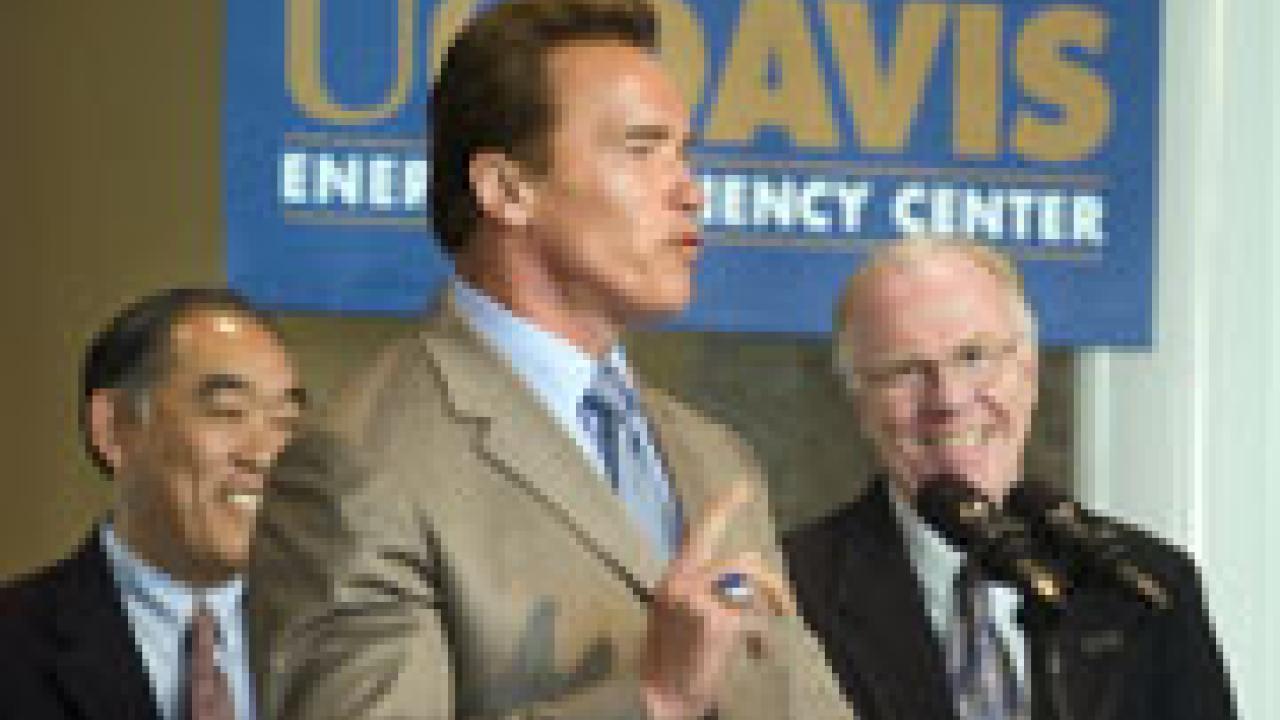You can watch a slideshow about this event.
Gov. Arnold Schwarzenegger came to UC Davis last week — his second visit recognizing academic programs here — to celebrate a $1 million grant establishing the country's first center of excellence in energy efficiency. The new center is dedicated to speeding the transfer of new energy-saving products and services into the homes and lives of Californians.
The UC Davis Energy Efficiency Center is expected to bring together leaders in academia, industry and the investment community to advance innovation in energy efficiency — the state's most critical energy resource. The center will also reinforce California's standing as a national and international leader in energy efficient practices that benefit both the environment and the California economy.
The California Clean Energy Fund awarded the grant to UC Davis because of what CalCEF officials said is the campus's exceptional commitment to developing and bringing energy efficient technology to the marketplace. UC Davis will match CalCEF's grant with $1.3 million in operating and research funds, faculty time, and office and laboratory space.
The California Clean Energy Fund is a nonprofit public benefit corporation dedicated to making equity investments in clean energy companies. Established in 2004 via the Pacific Gas & Electric settlement, CalCEF supports companies developing a wide range of clean energy technologies that will bring economic and environmental benefits to California, and assist the state in meeting its aggressive clean energy goals.
At the same time, PG&E Corp. also pledged significant funding support for the new center — $500,000 over five years for critical start-up needs such as funding for fellowships to attract and educate outstanding students, and for a major conference that will convene world-wide energy efficiency experts.
The Energy Efficiency Center's founding director is Andrew Hargadon, an associate professor at the UC Davis Graduate School of Management who is an expert on innovation in business and technology transfer. Hargadon was an engineer and product designer before earning a doctorate in organizational behavior.
"We want this center to bring together the people who devise new ways to save energy, those who finance their development, the manufacturers who make the products, and the industries and consumers who buy and benefit from them," Hargadon said. "The effective management of energy costs is increasingly important as companies strive to maintain a competitive edge. The center looks forward to helping California businesses measure and mitigate these costs, and manage the competitive risks associated with energy price volatility."
Dozens of UC Davis staff members, led by state government relations director Matthew Hargrove, worked long hours preparing for the event, which featured the governor; his chief science adviser, Terry Tamminen; Chancellor Larry Vanderhoef; and numerous other dignitaries, including the CalCEF governing board. (Hargrove also led the huge effort on April 20, 2004, when Schwarzenegger was here to proclaim the UC Davis hydrogen station the first stop on his new Hydrogen Highway.)
On the rainy morning of April 12, the officials and guests gathered in not-quite-finished Gladys Valley Hall, which was selected as the site for the announcement because it is the most energy-efficient building at UC Davis (and the second most efficient in the UC system). Previously known as the Veterinary Medicine Instructional Facility, the building is expected to use one-third less energy than a building of standard design.
Before his public remarks, Schwarzenegger took a tour led by campus senior architect Bill Starr. In one of the new student lounges, the governor talked for a few minutes with students from the School of Veterinary Medicine who described the student input that influenced the building's design features.
After the tour, Schwarzenegger stood onstage beneath three imposing banners depicting the three key areas of emphasis for the Energy Efficiency Center: transportation, homes and buildings, and agriculture and food processing. The banners, which gave the entire affair a sense of dignity and purpose, were art-directed by University Communications design manager Laurie Lewis and produced by senior designer Jay Leek. They had been rush-ordered when the governor's staff — on short notice — confirmed that he would come. Quite a few nails were bitten in the hours when the delivery truck from Salt Lake City crossed snowy Donner Pass earlier that morning.
After a quick riff on the proper German pronunciation of the chancellor's name ("Vanderhoff, or Vanderhoof, or Vanderherf, which is the real correct pronunciation of your name exactly, Vanderherf, but anyway I know you like to say Vanderhoof, so let's stay with that for right now"), the governor complimented the campus's commitment to environmental studies and described some of his administration's continuing efforts to reduce air pollution and greenhouse gas emissions.
"The UC Davis Center for Energy Efficiency is going to be a laboratory for ideas of the future," Scharzenegger said, "and I know that all of us working together — meaning government, people, the businesses and of course the brilliant minds of this center — we will bring a clean, prosperous future to California."
UC Davis officials have designated energy research and education as top campus priorities. The campus values interdisciplinary research and teaching, and 32 faculty members from 11 departments have signed on to the new Energy Efficiency Center. UC Davis also plans to recruit 12 new faculty members in the energy field during the next several years.
The Energy Efficiency Center joins the Institute of Transportation Studies, the Biomass Collaborative and the Wind Collaborative, and the California Lighting Technology Center as prime examples of UC Davis-led public-private partnerships geared toward solving the state's core energy challenges.
For more information, see http://eec.ucdavis.edu.
